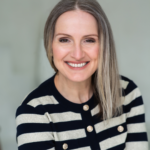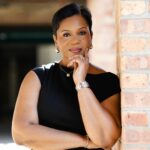Listen to the full interview:

1.Can you please provide a bit of a background about yourself, and tell us what you’re up to today?

“I’ve had the great experience of seeing so many things come through our world, life, and work. I currently serve as the Vice President of Learning for an amazing non-profit. We’re called NextUp. Our mission is to advance all women in the workplace. We do so in full collaboration and alliance with our advocates. So that’s what I’m up to these days… I have had many years of experience with many different for-profit, Fortune 500 companies. I see the impacts of polarizing conversations within the organizations I sit in, societal complexities with polarizing conversations, personal complexities... Sometimes we dread that Thanksgiving Day table with family members and things like that. We are at a time where these tools are going to be highly valuable. I’m super passionate about giving people tactical and practical tools they can use to actually do these things.”

2. Is there something in your background that has helped you see the value of having productive, polarizing conversations? What inspired you to be on a mission right now to help leaders with this?

“In my experience, in my work and personal life, I’ve seen the deficiency side of it—the absence of the ability and courage to be able to take on any and every discussion that needs to be had. And it has led to some really bad outcomes in my work and life. People hesitate to have polarizing conversations or harder discussions, be it in our personal or work life, because we fear it will erode the relationship. I have enough lived experience to know that it is quite the opposite, even though that’s lesser known. When we can actually have good conversations with people, it builds the relationship. It builds trust and capability and greater outcomes. I’ve spent the last 20 plus years doing things like building performance management tools, and I can tell you, with great respect to any readers who might be my co-colleagues in the HR practice, we spend a lot of time engineering tools and processes to simply do that one fundamental thing: say what needs to be said in a productive way. So, the absence of that has been a detriment to my ability to advance my career and build trust. And to be able to have those conversations has been a great tailwind that’s propelled me through my work in my professional and personal life. So that’s why I’m so passionate about it, about really just getting people to say what needs to be said in a productive way.”

3. What holds people back from saying what needs to be said?

“They fear it will erode the relationship, that if they say it, it’ll cause hard feelings, and they’ll lose their relationship with someone. Again, I’m able to easily refute that with the right tools. But with that being said, oftentimes we don’t learn those skills, and conversations can become very unproductive. Emotions can take over. They don’t know how to utilize the capabilities to keep it productive. Silence is where the destruction comes, where the misinformation lurks. The ability to talk about things that would be societally seen as stigmatized and taboo, it shines light and love. It really does. It dispels misinformation. It wraps humanity around all of us, the connectivity that we have as the human condition. It’s where that common ground is found. So, that’s why I think people shy away from it. I think the number one thing when I get asked about having discussions about societal issues, people tell me they fear saying the wrong thing. It’s my greatest comment I get. However, if we can offer your readers just a few tools and capabilities today, then we can hopefully take some of that fear out of the equation.”

4. Where can people start to approach more challenging conversations?

“There’s a technique that I garnered from the Linkage Institute many years ago, and I’m so glad I did. It’s a technique called Speaking From Center. And what it offers is that when you feel triggered by whatever it might be, you have to resist the inclination to react to what is happening and be able to respond to it. So, Speaking From Center allows you a moment of time to establish equilibrium when you feel triggered.
Oftentimes when I feel triggered by something, it can even feel physiological where you start to sweat, your head starts to pound and you’re thinking, ‘Who says that? Who does that?’
And the destruction doesn’t happen until we begin to speak from those spaces: ‘What the heck? Who thinks that?’
But if we can just suspend that inclination, take a deep breath and force ourselves to listen, mutual understanding can happen.
For example, I say, ‘Finka, what do you think about that?’
And you literally feel triggered by it, you can say something like, ‘You know what, Karen? I’m still very much processing what you’re saying, but please continue with your thoughts or expound on your thoughts.’
And what you’re doing in real time inside, is you are forcing yourself to listen, which is what we don’t do normally. Normally we are preparing to speak, completely zoning out what the person is saying. So, if we can do that, then we can listen and understand and probe for understanding.”

5. What is emotional intelligence and how can it help us have better, productive polarizing conversations?

“Emotional intelligence—for any who are not familiar—is simply the practice of understanding what’s happening on the inside of you, even before it comes on the outside; it’s the mastery of being able to manage what is happening on the inside.
If you can tap in and say to yourself, ‘Self, I am triggered,’ then you can suspend any disruptive behaviors.
We need to figure out—what are our motivations? Oftentimes as leaders, the motivation is to create the best team, product, and outcomes for the organization.
Also, emotional intelligence helps us access empathy. When it comes to accessing emotional intelligence and speaking from center, these techniques are not about agreement. They’re about understanding—listening effectively and understanding where a person is coming from.”

6. What else can people do to propel themselves forward in their careers?

“I think a leader who’s looking to differentiate themselves in their organization, if you can step into the space Finka and I are talking about today, I promise you it will make you distinctive. You will see so many people who haven’t even ascended to sea level, who have not gotten the tip of the iceberg of this skill—to be able to say what needs to be said in rooms. Now, how do you do that? Because I want to also talk about the nuance of being able to do that. Because when you’re mid-level or if you’re new to leadership, it takes a bit more skill; political–savvy isn’t a skill that’s taught. So, what you have to do is be able to practice and get some consultation. You can get some mentorship from other leaders that perhaps might be more senior and offer guidance on how you can contribute. You’ll be sitting in a room sometimes and you’ll think of something, you’ll hear something, and you feel it physiologically—your heart starts to pound, and you know that you want to say something. And I challenge you all to be able to do so using the techniques that Finka and I have talked about today.
And with that said, I offer one final note: no matter what your level of leadership, it’s much less intimidating to get your statement out there if you ask it opposed to a declarative statement. It will also keep you in the mind space of being inquisitive about what you may be having a reaction to.
So, by way of example, if you’re hearing, very hypothetically, ‘We’re going to double our sales quotas for next year.’
And you may be thinking, You must be kidding. You’re crazy.
Instead of saying that, you can raise your hand and say, ‘What path would we take in order to double our sales? Can you share more about the paths and tactics that we might take to double ourselves? Thank you so much.’
And that’s a much less intimidating way to get your question out there. It will help the room to grow, think, and pause, and you’ll contribute.
And I promise you, if you can do so effectively, you’ll start to have senior leaders come to you and say, ‘Hey, you have something. You have some senior leadership capabilities, and we see you as someone who can help us find a solution, a person who can ask the hard, right questions that keep us profitable.’”

7. What’s helped you navigate the corporate world and discover your Brilliant Difference?

“This year, I had the great honor to be recognized by the Hallmark Corporation on a recognition they have for the Hallmark Mahogany Division, which is one that celebrates women of colour. And they had a huge event where we were honored, and through that honor, they gave all of us a custom written poem that the creatives at Hallmark wrote. And the title of my poem was Courage Giver. And we mounted the stage with hundreds of people in the room, and they read the poem to me. And there’s a picture of me on LinkedIn in tears because I do really believe that is my Brilliant Difference™ and my gift to the world. It is to find the deep well of courage that exists in all of us and to help people with practical tools to access that. I believe it is the change that we need in the world, in our organizations, in our families to be able to lead with courage, to be able to lead with compassion, to listen to each other, to wrap humanity around each other, to know that those things that make us the same, outweigh those things that make us different in any dimension of life.”
Interviewer

Finka Jerkovic
Leadership Coach and Founder of Finka Inc.
With 25+ years in leadership and sales and the financial services industry, she has witnessed the power of recognizing and celebrating people’s unique strengths and differences (a.k.a Brilliant Differences™) within a workplace. When everyone’s unique talents are appreciated and people work together using them, that’s when the real magic of business growth happens. Fast forward 10 years. Finka has established programs that help corporate companies grow their businesses by tapping into the full potential of their teams, so they can clearly define their strengths, value their differences, and perform at their best.
Interviewee

Karen Jones
Founder of Sacred Leadership Solutions and VP of Learning at NextUp
Karen Jones has more than 15 years of experience in organizational effectiveness, leadership development, talent management, inclusion strategy design and execution, change leadership, and organizational process improvement. Karen’s career spans several Fortune 500 companies, including American Express, Sara Lee Corporation, U.S. Cellular, and Ulta Beauty. Her key strength lies in her ability to design and implement human capital strategies that realize desired and sustained outcomes. Karen has been particularly commended for her unique ability to create emotionally safe discussion environments, which has proven instrumental in achieving strategic goals. Karen also has extensive experience designing and implementing Diversity, Equity, and Inclusion (DEI) strategies. She has worked closely with leaders and employees of all levels to gain buy-in and active support to create inclusive workplaces. Karen has been complimented for her inspirational style and action orientation. Her true passion is to create a better world through great leadership in all aspects of life.


